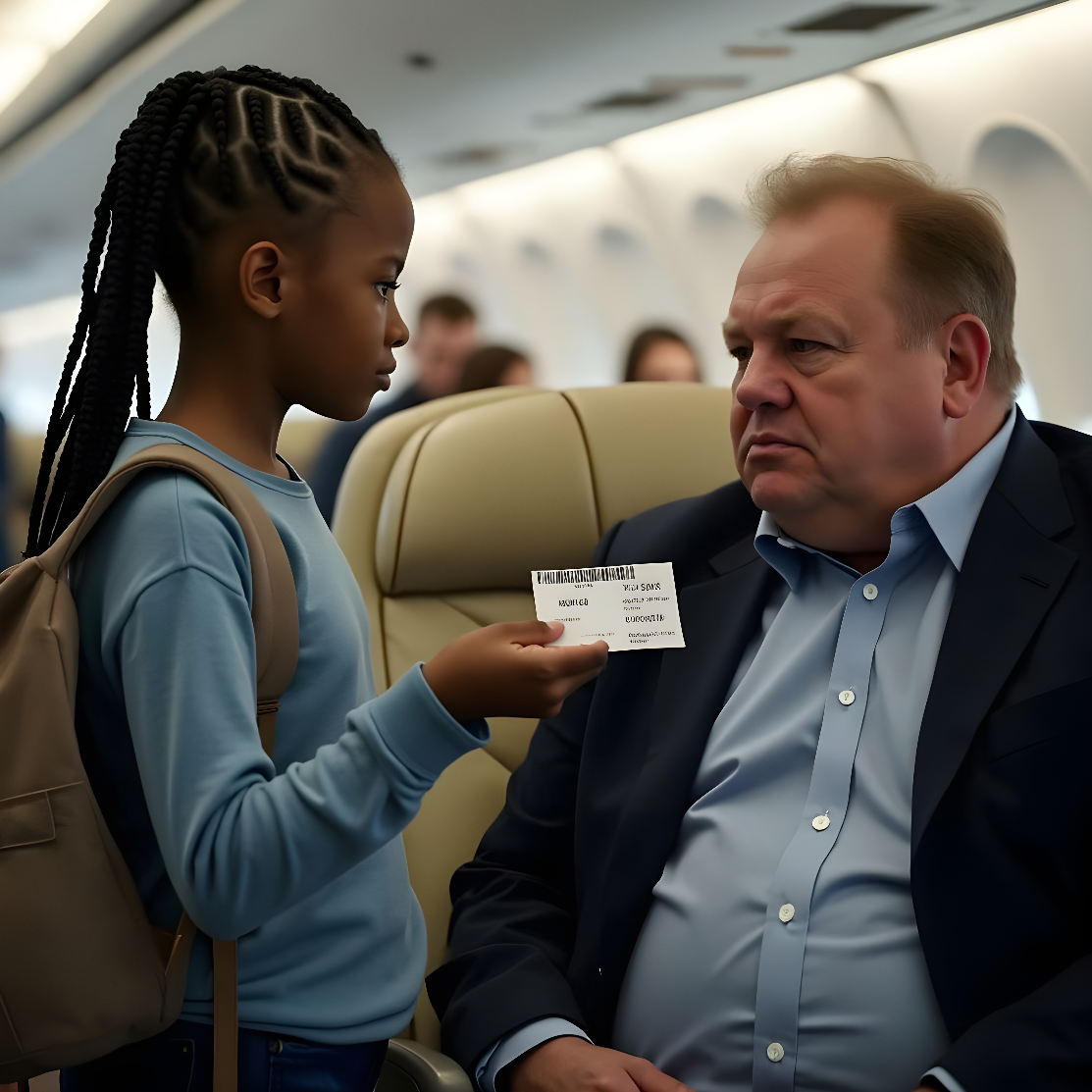The boarding gate hummed with its usual chaos—families herding children, business travelers glued to their phones, flight attendants moving with rehearsed precision. Yet in the middle of the noise stood a little girl who carried herself differently, as though the flight ahead of her was more than just a trip.
Her name was Amara. She was ten years old, her hair woven into neat braids threaded with tiny beads that clicked softly whenever she moved. In her backpack rested a book of stories she had written herself, pages filled with messy handwriting and wild dreams. This flight was her first step toward something greater. She was traveling to a youth writing competition where, for the first time, her voice would be heard.
Beside her stood Aunt Lila—guardian, teacher, and protector rolled into one. Lila leaned close, speaking just above the din of boarding announcements. “Remember, Amara, you belong here. Don’t let anyone tell you otherwise.”
Amara clutched her boarding pass—Seat 3A, first class. It wasn’t a luxury; it was a gift from the organization sponsoring her trip. She had whispered the seat number to herself the night before like a secret promise.
When they stepped onto the plane, the air shifted. The recycled oxygen smelled faintly of coffee and fabric cleaner, but beneath it was something heavier—a silence laced with curiosity. Eyes followed them, some curious, some dismissive.
And then Amara saw it.
Row three. Her row.
Seat 3A was already filled.
A man in his forties sat sprawled in the leather seat. His frame overflowed the boundaries of the armrests, his legs angled wide as if to declare ownership of every inch of space. His shirt strained at the buttons, and his flushed face carried the expression of someone used to being obeyed.
Amara froze, staring.
The man didn’t flinch. When his gaze finally met hers, there was no apology in it. Only irritation.
“You’re in the wrong place,” he said flatly.
Amara blinked. Her small hand lifted her boarding pass like a fragile shield. “This is my seat. 3A.”
He leaned back deliberately, his mouth twisting into a smirk. “Not today, sweetheart.”
The air thickened. Passengers nearby stiffened in their seats, pretending to scroll through phones or magazines while stealing glances. A couple two rows behind shifted uncomfortably, whispering. Yet no one intervened.
Amara felt her throat tighten. For a moment, she considered sliding into another row, letting the storm pass. That was the rule: be small, don’t make trouble. But then she remembered Lila’s words.
You belong here.
Amara swallowed hard. “Sir, this is my seat,” she said again, louder this time.
Her voice carried through the cabin. A few heads turned.
The man’s sneer deepened. “Do you know how much this seat costs? I’ve paid for upgrades like this my entire life. Don’t try to tell me a kid like you belongs here.”
Lila stepped forward, her eyes flashing. “She does belong here. That’s her seat. Now, are you going to move, or do I need to call the crew?”
The man waved a dismissive hand. “Oh, please. Just sit the child somewhere else. There’s plenty of room back there. Don’t waste everyone’s time.”
But time had already stopped. The hum of boarding faded into silence. Even the flight attendants hesitated at the edge of the aisle, caught between protocol and disbelief.
Amara’s legs shook, but she stood firm. She raised her voice again, her words trembling yet resolute. “I am sitting in my seat.”
The Turning Point
For a heartbeat, no one moved. Then something shifted in the air. A businessman in the row ahead twisted in his seat, frowning at the man. “She’s right. The ticket decides, not you.”
A woman across the aisle added, “Give her the seat. She’s a child.”
The murmurs grew, a ripple of voices pushing back against the silence.
The man flushed darker, his bravado cracking. “Mind your business,” he snapped. But the tide had already turned.
A flight attendant approached, professional smile strained. “Sir, may I see your boarding pass?”
He fumbled it from his pocket, thrusting it forward like a weapon. She scanned it, then looked up, her expression polite but firm. “Sir, you are assigned Seat 12C. This seat belongs to her.”
Gasps and whispers swirled through the cabin. The man’s mouth opened, then closed again. He sputtered, “This is ridiculous. I—I always sit in first class.”
“Not today,” the attendant replied evenly. “Please move, or we cannot depart.”
The weight of dozens of eyes bore down on him. For the first time, he looked small. With a final glare at Amara, he heaved himself up, muttering curses under his breath as he stomped down the aisle.
The Aftermath
Silence lingered for a breath. Then, softly, applause began. It started with the businessman in front, then spread across the rows. A dozen hands clapping, a quiet wave of solidarity.
Amara’s cheeks flushed. She ducked her head, but her heart soared. Lila squeezed her shoulder. “You did it,” she whispered. “You stood your ground.”
Amara slid into Seat 3A, her backpack resting gently on her lap. The leather seat seemed to embrace her, but it wasn’t the comfort that mattered. It was the truth: she had claimed her place, not just on the plane but in the world.
As the engines roared to life and the plane rolled down the runway, Amara opened her backpack. She pulled out her notebook, the one filled with stories, and wrote a single line at the top of a blank page:
Sometimes, the smallest voice can be the loudest in the room.
She smiled, the beads in her hair clicking softly with the movement. Outside the window, the earth fell away and the sky opened wide—hers to claim.
